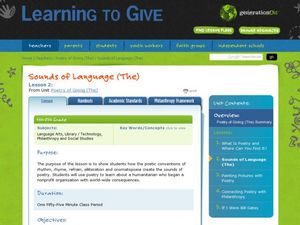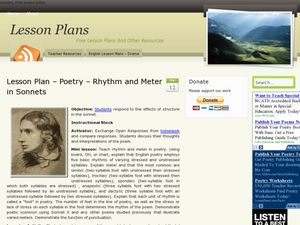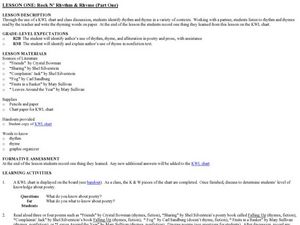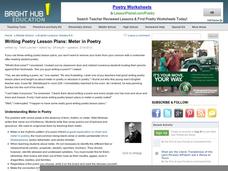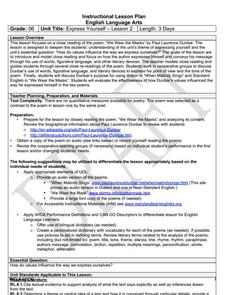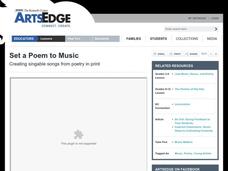Curated OER
Poetic Form
Learners read Red Boots On and explore prepositions. In this poetic form lesson, students analyze the use of prepositions in the poem. Learners might also explore the rhymes or objects. Students write original poems using whichever...
Poetry4kids
How to Write a Limerick
Add a little fun and fancy to English language arts with an activity that challenges scholars to write a limerick. Authors follow five rules in order to compose an original poem that contains a specific rhyme scheme.
Prestwick House
"Because I could not stop for Death" -- Visualizing Meaning and Tone
Emily Dickinson's "Because I could not stop for Death" provides high schoolers with an opportunity to practice their critical thinking skills. They examine the images, diction, rhythm, and rhyme scheme the poet uses and consider how...
Curated OER
"The Big Orchard Book of Funny Poems"
Students read and analyze various poems from the book "The Big Orchard Book of Funny Poems." They clap to the rhymes, identify patterns, compare and contrast poems, and write an alternative poem based on the poem "Christine Crump."
Curated OER
The Poetry of Giving
Learn about philanthropy and poetic conventions with an inclusive instructional activity about Bill Gates. After learning about Mr. Gates' humanitarian efforts in the world, sixth graders use alliteration, onomatopoeia, rhyme, rhythm,...
Curated OER
Poetry--Rhythm and Meter in Sonnets
Students identify rhyme scheme and meter in a poem and respond to the message of the poem. For this sonnet rhythm and meter lesson, students take notes on a lecture about rhythm and meter in sonnets and work in small groups to read...
Curated OER
Rock N Rhythm & Rhyme
Students explore rhyming and rhythm. In this rhythm and rhyme lesson, students listen to the song, "A-Hunting We Will Go" and add new verses to the song with words that rhyme. Students use an interactive tool to create these new verses.
Curated OER
Lesson One: Rock N Rhythm & Rhyme (Part One)
Second graders listen to poetry to find rhyme and rhythm. In this poetry lesson, 2nd graders listen to different types of poetry and find how they are alike. They look for rhyming words and create their own rhymes.
Curated OER
Poetry Elements
Need a quick review of some of the elements of poetry? Eleven key terms are defined and illustrated.
Curated OER
Poetry and Sound
How is poetry like music? It's all in the sounds. Provided in 17 slides are over a dozen poetry terms and their definitions. Some terms offer examples, and some do not. Consider adding examples for all terms so that you're as clear as...
Curated OER
Poe's Poetry and Prosody
Motivate your class with this instructional activity! Learners use passages from Edgar Allan Poe's poetry to practice reading fluency. They read "The Raven" as a rap song to better understand the rhyming patterns and pauses.
Teacher's Corner
Limerick
Young poets try their hand at one of the most popular fixed poetry forms, the limerick. The eighth in a series of ten poetry writing exercises.
Curated OER
Meter in Poetry
A good poem has form and structure built into it. Middle schoolers see that the structure of a poem consists of stanza, form, rhyme, and meter. The structure also contributes to a poem's meaning. After listening to, and discussing, a few...
Office of Migrant Education
Poetry: Form, Syllables, Mood, and Tone
Looking for a resource to introduce homeschoolers and other out-of-class learners to the elements of poetry? Check out this packet that defines and illustrates important poetry terms.
Curated OER
6th Grade: Express Yourself, Lesson 2: Close Read
The second instructional activity of a pair about Paul Laurence Dunbar, this plan focuses in particular on his poem, "We Wear the Masks." After a short historical introduction, class members conduct a series or readings, marking up the...
Curated OER
The Raven
After a close reading of Edgar Allan Poe's "The Raven" individuals copy the rhythm and rhyme scheme and rewrite the final stanzas of the poem.
Curated OER
Rhyme In Time
Students engage in a lesson that is concerned with the concept of rhyming and recognize them in different pieces of literature that includes songs, speech, and poetry. They also listen to music to make an auditory connection to the concept.
Curated OER
Set a Poem to Music
Students consider the role of rhythm and meter in poetry. In this integrated arts lesson, students discuss the attributes of poetry and use their music skills to set picture book poetry to music by creating "singable" poems.
Curated OER
Teaching Phonics Through Poetry
Students understand rhythm and rhyming words in poetry. In this poetry lesson, students listen to poetry and are able to find the ABAB pattern. Students recognize the "ow" sound. Students complete various activities to practice the...
Curated OER
Poetry: Using Prosodic Devices
Students examine poetry examples in free verse focusing on their prosodic elements. After critiquing works by several authors, they write their own poems utilizing such devices as alliteration, repetition, rhyme, and stanzas.
Curated OER
Splish, Splash Poetry
Students write weather shape poems and sing weather related songs. In this creative writing instructional activity, students read the book, It's Raining, It's Pouring and list weather words they heard in the story. Students use the...
Curated OER
Lesson Two: Rock N Rhythm & Rhyme (Part Two)
Second graders find rhythm and rhyme in poetry. In this poetry lesson, 2nd graders listen to different poems to find the rhyming words. They play a memory game and try to find two words that rhyme.
Curated OER
Poetry Power
Second graders explore language arts by analyzing poems in their class. In this word play lesson, 2nd graders define the terms rhyme, rhythm and alliteration and identify their uses. Students utilize class word lists to write their own...
Curated OER
Create a Poem
Students write three simple rhyming poems and read them aloud with rhythm. Students select two adjectives that are opposites and two rhyming verbs to create rhyming lines of the same length with an adjective-noun-verb pattern.






